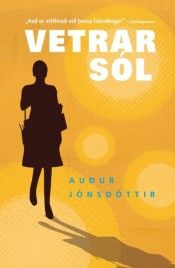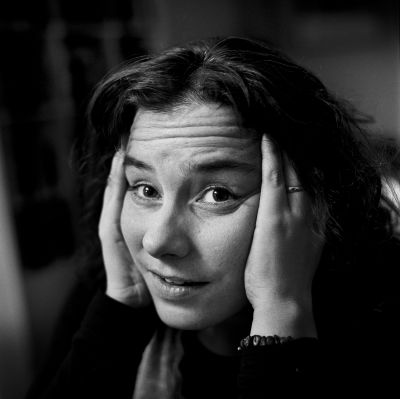Winter Sun
"Turbulence is important, not tidiness," says Auður Jónsdóttir of her fast-paced novel Winter Sun, which was released by German publishing house btb last spring, and thumbs its nose at just about every genre convention you can think of.
“Turbulence is important, not tidiness,” says Auður Jónsdóttir of her novel Winter Sun. A German translation of the book was published by the major publishing house btb last spring, marking the first time Auður's work is published in Germany.
 The protagonist of Winter Sun is Sunna, a confused young woman described by Auður as “a leaf in the wind”, passively drifting through life. One day in December, however, when the days are at their shortest and darkest, Sunna is forced to come to terms with her past: Just as her employer, a publishing house, grants her a chance to direct a course on crime fiction, she needs to look after the son of her boyfriend, who is stranded in the Westfjords of Iceland by a an unrelenting storm. To complicate matters even further, Sunna comes across a notice on the internet announcing that an old schoolmate of hers has gone missing in Barcelona. As if on a cue, three mysterious men begin following her around, and Sunna's life suddenly seems to have taken on all the trappings of a thriller.
The protagonist of Winter Sun is Sunna, a confused young woman described by Auður as “a leaf in the wind”, passively drifting through life. One day in December, however, when the days are at their shortest and darkest, Sunna is forced to come to terms with her past: Just as her employer, a publishing house, grants her a chance to direct a course on crime fiction, she needs to look after the son of her boyfriend, who is stranded in the Westfjords of Iceland by a an unrelenting storm. To complicate matters even further, Sunna comes across a notice on the internet announcing that an old schoolmate of hers has gone missing in Barcelona. As if on a cue, three mysterious men begin following her around, and Sunna's life suddenly seems to have taken on all the trappings of a thriller.
"You get your thrills, your resolution..."
Although thematically related to Auður's earlier works, The People in the Basement (orig. Fólkið í kjallaranum) and Deposit (orig.Tryggðapantur), Winter Sun is a different kind of work in many regards, and more restless. The plot, which at first seems poised to follow the well-worn conventions of a crime novel, instead veers off into unexpected directions, with many possible conclusions on offer, and no tidy solution in sight.
Speaking to us, Auður maintains that her primary goal with the book was to have fun writing it. “I had already published a big family story, The People in the Basement, and then Deposit, which was a very political book. With Winter Sun, I wanted to have a bit of fun, so I allowed myself to play around with certain genres, such as crime fiction and chick-lit. The book is a satire on these kinds of books, really. Reading them is sort of like going to a carnival: You get your thrills, your resolution, and then you go home to bed on a full stomach. Winter Sun consciously swims against this current – once you're done, it has even more possible ends than when you started, and you can't possibly go to bed on a full stomach. It was intended as an inversion of this unbearable lightness of being.” She laughs: apparently, there is still fun to be had with the book.
Beyond the sea lies the world
 Judging by the Winter Sun's reception in Germany, Auður's playful rebellion against the tyranny of genre seems to have found its mark. “An innovatively written, exciting and moving book […] an encouragement to travel to Iceland,” was the opinion of Der Spiegel's reviewer. Hamburger Abendblatt was also impressed: “We have plenty of saucy female writers in Germany, writing cheeky chick-lit novels, but they all seem to have been concocted by latte-sipping girlfriend groups. We need deep books in polished prose. We should import them from Iceland!” The reviewer of Frankfurter Allgemeine, in turn, found the books many narrative strands to be woven together with “effortless know-how. The story's development is clever with out being overthought, and it is as funny as it is exciting.”
Judging by the Winter Sun's reception in Germany, Auður's playful rebellion against the tyranny of genre seems to have found its mark. “An innovatively written, exciting and moving book […] an encouragement to travel to Iceland,” was the opinion of Der Spiegel's reviewer. Hamburger Abendblatt was also impressed: “We have plenty of saucy female writers in Germany, writing cheeky chick-lit novels, but they all seem to have been concocted by latte-sipping girlfriend groups. We need deep books in polished prose. We should import them from Iceland!” The reviewer of Frankfurter Allgemeine, in turn, found the books many narrative strands to be woven together with “effortless know-how. The story's development is clever with out being overthought, and it is as funny as it is exciting.”
“Different countries often have different reactions to a book, and you never know how it will turn out,” says Auður, when we ask her about the book's reception. “The German critics seem to like the prose style, which must mean that the translation is good. Kristof Magnusson, who translated the book, is a respected author in Germany, and an excellent translator. So many of these reviews deal with the book's style. For a book to get across in another language, a good translator is of course crucial. I've been lucky in that regard.”
What do you think of the German title? It's rather different from the Icelandic one.
“I'm happy with it, though it wouldn't work here in Iceland. Literally, it amounts to “Beyond the Sea Lies the World,” and it probably says more than the original title. Unless the main reason for the change was that a book called Winter Sun wouldn't have been easy to market in the spring, when the book was published,” she says, laughing.
Turbulence, not tidiness
This book seems more turbulent than you previous work.
“Winter Sun was written with exactly that in mind: it's not supposed to be tidy. To a certain extent, it's a farce. I know that some readers couldn't make heads or tails of it, but that was the point – turbulence is what's important, not tidiness. There were some who wanted the book to be a straightforward crime novel, but it consciously avoids going down that path.
“The protagonist of Winter Sun is a character type I've worked with before: the passive woman, who makes things worse with her passivity. A woman living from one day to the next, believing her life to be fairly normal. However, when she begins digging around in her past she uncovers a sequence of events that she must make up her mind about – whether it's criminal or not. She is forced to become a participant in life.
“In the book, I reflect on the question of where the guilt lies. Crime novels are all about discovering the culprit. The protagonist of Winter Sun, however, is stuck with her own guilt, so the question is: What does this guilt consist of?”
Apathy is the greatest crime of all
On top of Auður's tinkering with various literary genres, the outer trappings of the book trade – the buying, selling and marketing of books – play a significant role in the story. Even the Frankfurt Book Fair itself played a role in the work's inception.
“While I was writing Winter Sun, I went to Frankfurt as a journalist, to cover the book fair. Once I was there, the whole thing reminded me a bit of the Woody Allen film Everything You Always Wanted to Know About Sex (But Were Afraid to Ask). The book fair was like this giant brain for the Western Hemisphere, deciding what would be read next year. It made me think of this Western reality, and consumption in general. Books and democracy have such an intimate relationship. Certain ideas are constantly fed to us, and when you allow yourself to be fed, you give up so much.
“That is why it is appropriate that the protagonist Sunna, who works in this world, is like a leaf in the wind. Her trade is symbolic of her entire life – it's something that is decided by others. Coincidence decides what is bought and sold, often by people who aren't even interested in literature, and perhaps we are all to blame, for not questioning what is handed down to us.”
It is said that your books always carry an urgent moral note. Are you a polemical writer?
“I think that Winter Sun was an attempt to escape just that. First and foremost, I meant to have fun with it. There's more of a polemical writer in you during youth, which is fine and good, but then you grow jaded with age and develop a sense of humour towards the faults of yourself and others.
“Winter Sun is about life's inherent tendency towards the farcical, but it also touches on the deep seriousness we live with, but are normally afraid of looking squarely in the eye. That's the reality we live with. The protagonist drifts downstream through life; she always accepts what is handed to her. But suddenly it all becomes too much, and she is forced to look into her past. Perhaps apathy is the greatest crime of all.”
Interview: Davíð K. Gestsson
Translation: Steingrímur Teague
Photo of author: Kristinn Ingvarsson
